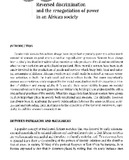| dc.description.abstract | Gender relations in Africa have always been important especially given the active involvement of women in production as well as reproduction processes. Women have always been actively involved in traditional economies as sole providers of food and nourishment whether such societies are agricultural or pastoral. More recently, women have been intricately involved in the production of goods and services which buoy both local and national economies of diferent African countries and could easily be noticed in various economic activities in both the trasitional and cosmopolitan locale. But more importantly , women are sometimes solely responsible for social reproduction in their capacity as minders of children and young adults. It is usually their responsibility to pass on societal norms and values to the next generation of Africans by helping them understand the ethos and cultural practices of the society. What this suggests is that Africa women have always held an important place in society both traditional and modern. The difficulty, however, has always been in analysing the power relationships between the sexes in African societies and understanding them in relation to the objectives of the feminist movement, especially, its call for womens emancipation. | en_US |

